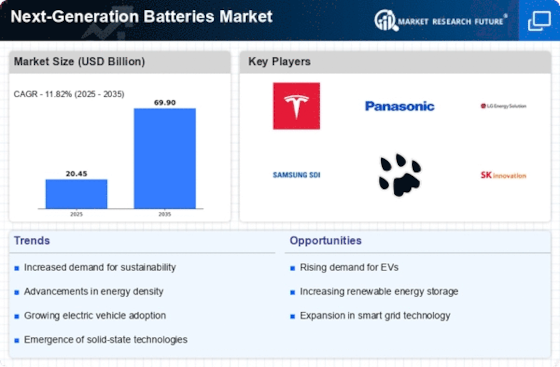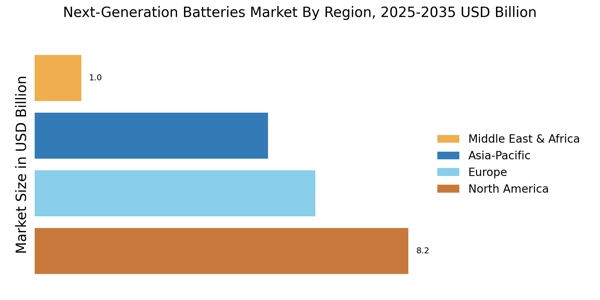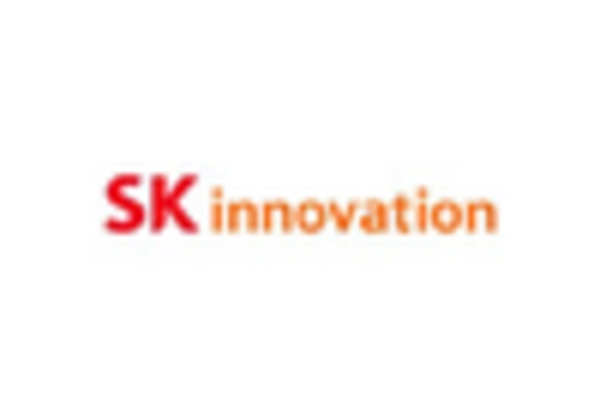Rising Demand for Electric Vehicles
The increasing adoption of electric vehicles (EVs) is a primary driver for the Next-Generation Batteries Market. As consumers and manufacturers alike prioritize sustainability, the demand for efficient and long-lasting batteries has surged. In 2025, the EV market is projected to grow at a compound annual growth rate (CAGR) of approximately 20%, necessitating advancements in battery technology. This growth is not merely a trend; it reflects a broader shift towards reducing carbon emissions and reliance on fossil fuels. Consequently, manufacturers are investing heavily in next-generation battery technologies, such as solid-state batteries, which promise higher energy densities and improved safety. The interplay between the automotive sector and battery innovation is likely to shape the future landscape of the Next-Generation Batteries Market.
Expansion of Renewable Energy Sources
The expansion of renewable energy sources is a crucial driver for the Next-Generation Batteries Market. As the world transitions towards cleaner energy, the need for efficient energy storage solutions becomes paramount. Next-generation batteries play a vital role in storing energy generated from renewable sources such as solar and wind. In 2025, the renewable energy sector is projected to grow significantly, with investments expected to reach USD 1 trillion. This growth necessitates advanced battery technologies that can efficiently store and distribute energy. The integration of next-generation batteries with renewable energy systems not only enhances energy reliability but also supports grid stability. As the demand for renewable energy continues to rise, the Next-Generation Batteries Market is poised for substantial growth.
Government Initiatives and Regulations
Government policies and regulations aimed at promoting clean energy solutions are significantly influencing the Next-Generation Batteries Market. Many countries are implementing stringent emissions targets and providing incentives for the adoption of electric vehicles and renewable energy sources. For example, various governments are investing in research and development initiatives to support battery technology advancements. In 2025, funding for battery research is expected to exceed USD 10 billion, reflecting a commitment to fostering innovation in this sector. These initiatives not only encourage manufacturers to develop next-generation batteries but also create a favorable environment for market growth. As regulatory frameworks evolve, they will likely continue to shape the landscape of the Next-Generation Batteries Market.
Technological Innovations in Energy Storage
Technological advancements in energy storage solutions are propelling the Next-Generation Batteries Market forward. Innovations such as lithium-sulfur and solid-state batteries are emerging as viable alternatives to traditional lithium-ion batteries. These new technologies offer enhanced energy density, longer life cycles, and improved safety features. For instance, solid-state batteries can potentially double the energy density of conventional batteries, making them highly attractive for various applications, including consumer electronics and electric vehicles. The market for energy storage systems is expected to reach USD 200 billion by 2026, indicating a robust demand for next-generation battery technologies. As research and development continue to evolve, the integration of these advanced technologies into everyday applications will likely redefine energy storage capabilities.
Growing Consumer Awareness of Sustainability
Consumer awareness regarding sustainability and environmental impact is increasingly driving the Next-Generation Batteries Market. As individuals become more conscious of their carbon footprints, there is a growing preference for products that utilize sustainable battery technologies. This shift is evident in the rising demand for electric vehicles and renewable energy storage solutions. In 2025, it is estimated that over 50% of consumers will prioritize sustainability in their purchasing decisions, influencing manufacturers to adopt eco-friendly practices. The emphasis on recycling and the development of batteries with lower environmental impact are becoming critical factors in product design. Consequently, companies that align their strategies with consumer values are likely to gain a competitive edge in the Next-Generation Batteries Market.

















